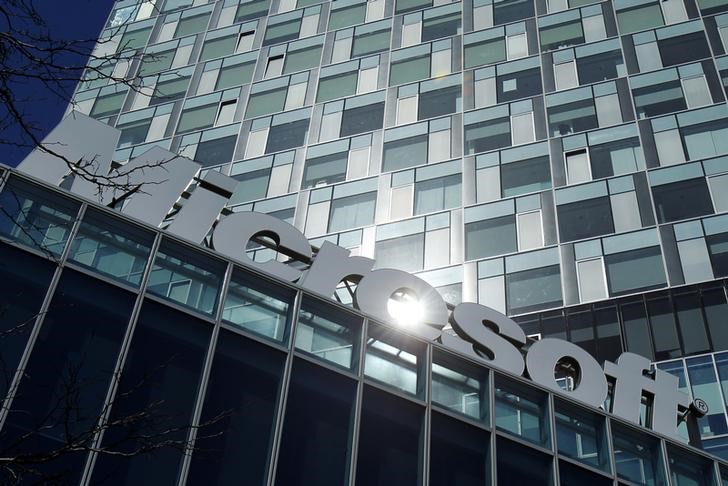Fed’s Powell opens door to potential rate cuts at Jackson Hole
Lastly, Goldman Sachs pointed out that the market value of Microsoft's investment in OpenAI, estimated between $31 billion and $79 billion, is not fully reflected on the balance sheet. Instead, it only shows the carrying value of the investment. The slowing pace of CapEx growth is expected to lead to increased net interest income over the next two years, which could offset some of the investment costs. With Microsoft's next earnings report due in 2 days and a strong analyst consensus rating of 1.41, InvestingPro subscribers can access real-time updates and detailed financial metrics to make informed investment decisions. With Microsoft's next earnings report due in 2 days and a strong analyst consensus rating of 1.41, InvestingPro subscribers can access real-time updates and detailed financial metrics to make informed investment decisions. The analysts expressed confidence in the stock, citing Microsoft's earnings per share (EPS) leverage and the integration of Gen-AI into its platforms and applications.
Lastly, Goldman Sachs pointed out that the market value of Microsoft's investment in OpenAI, estimated between $31 billion and $79 billion, is not fully reflected on the balance sheet. Instead, it only shows the carrying value of the investment. The slowing pace of CapEx growth is expected to lead to increased net interest income over the next two years, which could offset some of the investment costs. With Microsoft's next earnings report due in 2 days and a strong analyst consensus rating of 1.41, InvestingPro subscribers can access real-time updates and detailed financial metrics to make informed investment decisions. These include the incorporation of OpenAI's losses, which are proportional to Microsoft's investment exceeding $13 billion, into the company's financial estimates. Goldman Sachs expects about $6 billion per year in related costs for fiscal years 2025 and 2026.
Goldman Sachs suggests that Microsoft's updated partnership with OpenAI indicates a cautious approach to further investments, potentially limiting downside risks. The firm also anticipates a moderation in capital expenditures (CapEx) growth, forecasting an increase of 47% in fiscal year 2025 and 8% in fiscal year 2026, compared to the 75% growth seen in fiscal year 2024. This expected moderation in CapEx growth should provide clearer insights into the profit and loss (P&L) without compromising Microsoft's capacity expansion capabilities.
The analysts expect that the re-acceleration of Azure, Microsoft's cloud computing service, along with a broader resurgence in cloud migration, will help balance the aforementioned costs. Goldman Sachs' projections show a gross margin (GM) contraction of 130 basis points in fiscal year 2025 and 25 basis points in fiscal year 2026, which is less severe than the Street's estimates of 150 and 90 basis points, respectively.
Lastly, Goldman Sachs pointed out that the market value of Microsoft's investment in OpenAI, estimated between $31 billion and $79 billion, is not fully reflected on the balance sheet. Instead, it only shows the carrying value of the investment. The slowing pace of CapEx growth is expected to lead to increased net interest income over the next two years, which could offset some of the investment costs.
In other recent news, Microsoft Corporation (NASDAQ:MSFT) has been the subject of various analyst evaluations. Stifel analysts maintained a Buy rating on the company's stock, with a target at $515, anticipating a transitional period for the tech giant. KeyBanc Capital Markets reiterated its Overweight rating with a steady price target of $575.00, highlighting a significant increase in Azure instances. TD Cowen reiterated its Buy rating with a price target of $475.00, despite potential challenges such as shifts in workloads and foreign exchange impacts. Raymond (NSE:RYMD) James maintained its Strong Buy rating and $480.00 price target, while Bernstein analysts reiterated an Outperform rating with a stable price target of $516.00.
Recent developments include Microsoft's Executive Vice President, Christopher D. Young, resigning effective immediately, and the company's involvement in the Stargate Project, a proposed investment of up to $500 billion over the next four years to expand AI infrastructure in the U.S. Microsoft, along with Nvidia Corp . (NASDAQ:NVDA), will also provide technology support for a $100 billion joint venture in the AI sector involving SoftBank (TYO:9984) Group Corp., OpenAI, and Oracle Corp (NYSE:ORCL).
Furthermore, Kopin Corp has expressed interest in the U.S. Army's recompetition process for Microsoft's Integrated Visual Augmentation System (IVAS) production contract, leading to a Buy rating from a Lake Street Capital Markets analyst. These are recent developments in the technology industry.
This article was generated with the support of AI and reviewed by an editor. For more information see our T&C.
